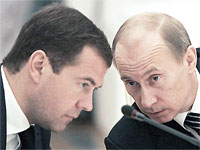Castling in the sand
Tim Wall - Moscow News editorial - themoscownews.com - 5.3.12 - JRL 2012-81
Russia's leaders often leave a troubled legacy behind them. Apart from controversial victories or defeats, they are often remembered with fear and awe, and associated with tragedy or farce (in the case of Boris Yeltsin, it was both).

file photo
But seldom have they left such a blank page of unmet promise as Dmitry Medvedev.
Four years ago, although some critics saw the 42-year-old St. Petersburg lawyer as little more than Vladimir Putin's placeman, many others were prepared to believe that he could reform the system.
But as Medvedev formally leaves office this weekend, his legacy is more about the reforms he failed to carry out.
Most notably, Medvedev's "modernization," anti-corruption and judicial reform campaigns were little more than castles in the sand, blown over by the first strong gust of wind or swept away by the tide of bureaucracy that he never really got to grips with.
If, when Putin left the Kremlin in 2008, bribes and "legal nihilism" were high, they are equally rampant or even higher now.
Russia scored some notable successes on his watch, but he didn't get to cash in on them. The 2008 victory over Georgia isn't really regarded as Medvedev's, and Putin and ex-Finance Minister Alexei Kudrin got the credit for Russia's recovery from the 2008-09 economic crisis. Even winning the right to host the FIFA World Cup was widely seen as Putin's doing.
In military reform, Medvedev did, arguably, make more of a difference putting the country on the road to a modern, professional army. But even there, difficult questions remain about corruption, hazing and the lack of housing for retired officers.
For many Russians, Medvedev was more about style than content: the "tweeting," nice-guy president who always looked a little out of place next to his tough-guy mentor never so much as on Tuesday's May Day rally, where his natty white coat drew unfavorable comparisons with female fashion models.
Above all, last September's revelation that he and Putin had planned their "castling" maneuver all along destroyed Medvedev's credibility among his natural constituency: the young, urban middle class. Recovering their confidence may be beyond the tandem now, and memories of their faith in Medvedev may fade quicker than yesterday's sandcastles.
Keywords: Russia, Government, Politics - Russian News - Russia
Russia's leaders often leave a troubled legacy behind them. Apart from controversial victories or defeats, they are often remembered with fear and awe, and associated with tragedy or farce (in the case of Boris Yeltsin, it was both).

file photo
But seldom have they left such a blank page of unmet promise as Dmitry Medvedev.
Four years ago, although some critics saw the 42-year-old St. Petersburg lawyer as little more than Vladimir Putin's placeman, many others were prepared to believe that he could reform the system.
But as Medvedev formally leaves office this weekend, his legacy is more about the reforms he failed to carry out.
Most notably, Medvedev's "modernization," anti-corruption and judicial reform campaigns were little more than castles in the sand, blown over by the first strong gust of wind or swept away by the tide of bureaucracy that he never really got to grips with.
If, when Putin left the Kremlin in 2008, bribes and "legal nihilism" were high, they are equally rampant or even higher now.
Russia scored some notable successes on his watch, but he didn't get to cash in on them. The 2008 victory over Georgia isn't really regarded as Medvedev's, and Putin and ex-Finance Minister Alexei Kudrin got the credit for Russia's recovery from the 2008-09 economic crisis. Even winning the right to host the FIFA World Cup was widely seen as Putin's doing.
In military reform, Medvedev did, arguably, make more of a difference putting the country on the road to a modern, professional army. But even there, difficult questions remain about corruption, hazing and the lack of housing for retired officers.
For many Russians, Medvedev was more about style than content: the "tweeting," nice-guy president who always looked a little out of place next to his tough-guy mentor never so much as on Tuesday's May Day rally, where his natty white coat drew unfavorable comparisons with female fashion models.
Above all, last September's revelation that he and Putin had planned their "castling" maneuver all along destroyed Medvedev's credibility among his natural constituency: the young, urban middle class. Recovering their confidence may be beyond the tandem now, and memories of their faith in Medvedev may fade quicker than yesterday's sandcastles.